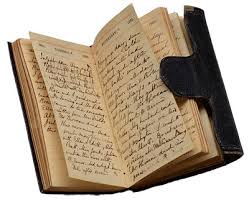记忆方法
将“diary”分解为“die”和“ary”。想象“die”在日(day)记下自己的经历和想法,通过这种画面,你可以记住“diary”是指日记本。
以上内容由AI生成, 仅供参考和借鉴
中文词源
diary 日记
来自拉丁语dies, 白天,词源同diurnal. 即一日记录。
英语词源
- diary
-
diary: [16] Like its semantic cousin journal, a diary is literally a ‘daily’ record. It comes from Latin diarium, a derivative of diēs ‘day’. Originally in classical Latin the word meant ‘daily allowance of food or pay’, and only subsequently came to be applied to a ‘record of daily events’. From the 17th to the 19th century English also had an adjective diary, from Latin diarius, meaning ‘lasting for one day’.
- diary (n.)
- 1580s, from Latin diarium "daily allowance," later "a journal," neuter of diarius "daily," from dies "day" (see diurnal); also see -ary. Earliest sense was a daily record of events; sense of the book in which such are written is said to be first attested in Ben Jonson's "Volpone" (1605).
权威例句
- 1. In his diary of 1944 he proclaims unswerving loyalty to the monarchy.
- 他在1944年的日记里声称对君主忠贞不贰。
- 2. Ever since I saw the diary excerpts I've been cast down.
- 自从看到日记摘录,我就一直非常沮丧。
- 3. As I scribbled in my diary the light went out.
- 我正草草地写着日记,灯灭了。
- 4. She kept a diary until shortly before her death.
- 直到去世前不久她都一直在记日记。
- 5. Mr Wilson's diary is booked up for months ahead.
- 威尔逊先生后几个月的日程都已经排满了。

